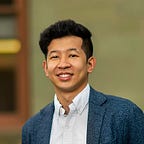The Risks of Living in Neutral Gear
My Learnings on Individual Identity and Fate Throughout College
The human genetic makeup is encoded by patterns and matrices of four different building blocks called nucleotides, controlling for not only all our physical traits such as the colour of our hair and the shape of our faces, but also our behavioural traits such as our personalities and our moods. With these codons, we can produce an infinite number of combinations that generate genes crucial for our survival simply by the location at which they are placed adjacent to each other. Although most of our genetic makeup is conserved across humans and inherited across generations, there still exists genetic variation driven primarily by mutations, the random changes in the sequences of genes. Despite this variation being small (0.1%), they work to shape who we are as individuals.
It is quite extraordinary that the differences between us and a stranger rest in this 0.1%. While much of our physical and psychological identities are established by nature upon birth, much of our fate is still influenced by external factors outside of our control — some may even say almost random. Amongst such randomness bounded in a prism of order, we are left with the central paradox: how can our genetic code be so vast and limiting at the same time? With such ambiguous yet pre-constructed notions of identity, what natural forces work to shape our fate?
Four years ago, I entered college with the belief that most of our fate is predetermined not only by our genetic predispositions but also by our early childhood conditioning. Although I didn’t consider myself as an extreme naturalist, I did believe that behaviour was more biologically determined and that the exposure to different environmental conditions facilitates the outward manifestation of many behavioural tendencies. In other words, I felt that there was an inherent connection between our genes and the environment, in which the latter only worked to facilitate the expression of the former. This hypothesis perpetuated feelings of complacency and self-approbation. A sense of urgency and autonomy was always lacking, and I felt that my life was consistently in neutral gear. I strove to pursue initiatives that reflected my self-proclaimed strengths and ignored those that evoked my weaknesses or fears. I also let fate govern most of my interactions with others, truly trapping myself in smug passivity.
Throughout these formative years, I was fortunate to have been surrounded by individuals who challenged my preconceived notions of identity and fate. With their help, I’ve reformulated my interpretations of individual reality. I use the word individual because our understandings of reality are inherently subjective, created by our values alongside our judgements and driven by our endeavours. There exists a certain dignity in understanding that one’s own aspirations may vary from another’s and that just like our genetic sequences, there exists an infinite number of individual conceptions of reality. Such differing interpretations of the universe most certainly raises feelings of existential despair, but I believe that only our personal conceptions matter, triumphing any external views. In combination with this first takeaway, I’ve also realized that much of our individual fate is driven by our actions — more specifically, our choices. Controlling for biological limitations of human nature or aspects of life that are inherent such as the way we look or our genetic history, our choices regulate much of our place in this universe. Our choices empower us in the unending pursuit of happiness and reflect much of our individual understandings of the world as I highlighted above. Unlike my younger self, I no longer believe that genes outweigh the environment in forming our identity nor do I believe that our environment dictates our fate. What truly governs the construction of personal destiny is choice and choice alone. As a result, what we choose to do with our life most aptly reflects our future trajectory.
In a hypothetical scenario where two genetically identical twins live in separate parallel universes and encounter the same experiences up to when they turn 20, it would be highly unlikely that these two individuals would end up at the same place when they turn 30 and even more unlikely at 40 or 50. Given this, the randomness characterizing human genetic variation that of course plays a role in forming our identities seems to be dwarfed by more powerful forces that I shall name intention. While the human genome is certainly spectacular and forms the foundation of our physical and psychological constructions, our destiny assembles itself into the hands of intent.
